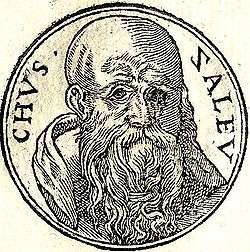Zaleucus

Zaleucus (Ancient Greek: Ζάλευκος; fl. 7th century BC) was the Greek lawgiver of Epizephyrian Locri, in Italy, said to have devised the first written Greek law code, the Locrian Code.
Although the Locrian code distinctly favored the aristocracy, Zaleucus was famous for his conciliation of societal factions. No other facts of his life at all are certain. According to legends, he punished adultery with the forfeiture of sight. When his own son was condemned of this, he refused to exonerate him, instead submitting to the loss of one of his own eyes instead of exacting the full penalty of the culprit.[1] Another law that he established forbade anyone from entering the Senate House armed. Faced with an emergency, he did so anyway, but when he was reminded of the law, he immediately fell upon his sword as a sacrifice to the sovereignty of the claims of social order. A similar story is told of Charondas.
Anyone who proposed a new law, or the alteration of one already existing, had to appear before the Citizen's Council with a rope round his neck. If the Council voted against the proposal the proposer was immediately strangled.[2]
Demosthenes (in "Against Timocrates"), who to persuade the Athenians not to change any law upon small and frivolous pretences, gives the example of these Locrians, with whom, says he, it's a law, that a man who shall propose to make any new law shall do it with a rope about his neck, which he shall be strangled in, if he do not carry his point: which has been such a guard and defence to the laws, that there has been but one new one made in MORE THAN TWO HUNDRED YEARS. (Demost. in Timocr. p. 469.) Now. that Demosthenes here speaks of Zaleucus's laws is plain enough from his naming the Locrians; but it appears further from the law itself. For Hierocles and Polybius's author say expressly, that this law about the rope was Zaleucus's; (Hieroc. apud Stobaeum, Serm. 37. Polyb. xii, p. 661.)[3]
References
- Aristotle, Politics
- Diodorus Siculus
- Charondas
Simcox, Edith Jemima (1894). Primitive Civilizations: Or, Outlines of the History of Ownership in Archaic Communities. S. Sonnenschein & Company. pp. 449–. ST8KAQAAMAAJ. p.449: All that is known from classical sources about the laws of Zaleucus and Charondas will be found towards the end of Bentley's Dissertation upon Phalaris. ('Works', i. 376-417.)
- ↑ This incident is recounted in Book 6, Chapter 5 of Memorable Deeds and Sayings by Valerius Maximus, and is presented in a slightly altered form in Tale 50 of Gesta Romanorum.
- ↑ This anecdote is cited by Edward Gibbon in his discussion of the origin of Roman jurisprudence and of the Twelve Tables in particular in Chapter XLIV of The History of the Decline and Fall of the Roman Empire.
- ↑ Bentley, Richard (1836). The works of Richard Bentley, collected and ed. by A. Dyce. pp. 381–. fSwCAAAAQAAJ.
image of p.381 at Google Books ( https://books.google.com/books?id=fSwCAAAAQAAJ&pg=PA381&img=1&zoom=3&hl=en&sig=ACfU3U3RdPAAR0f2mbO32thD3-afsuvj6Q&ci=83%2C745%2C743%2C590&edge=0 )
External links

- 1911 Encyclopædia Britannica article
- Sheridan, Paul (2015-07-12). "A New Zaleucus to Rebuke us in the Online Age". Anecdotes from Antiquity. Retrieved 2015-08-27.
